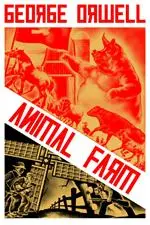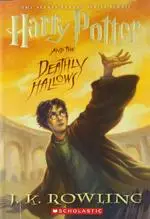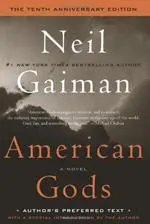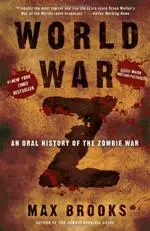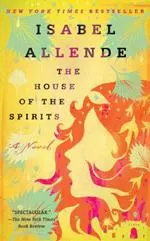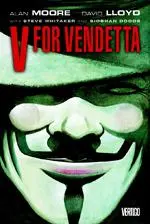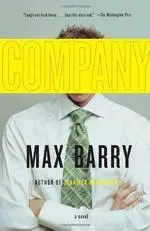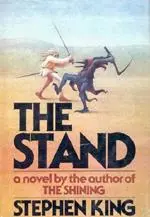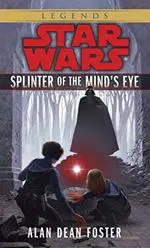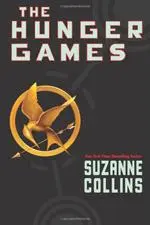July is a month loaded down with historical revolutions and declarations of independence. There's the big, obvious American one, of course—a holiday known as the Fourth of July. Venezuela also expatriated themselves from Spain one day and thirty-five years later. We had the Young Turk Revolution of July, 1908. The Spanish Civil War began in July of 1936. Fidel Castro and his men attacked army barracks in Santiago on July 26th, 1953, an act that, while a failure at the time, eventually led to the Cuban Revolution and Castro's seizing of power. There was also the July Revolution, otherwise known as the French Revolution of 1830, though it had less to do with the summer month than it does the name of of the monarchy that led the revolt, the Monarchie de Julliet. But hey, I'm sure some battles went down during July, right?
In celebration of that revolutionary spirit, here are ten fictional accounts of riot, upheaval, and dissent for your reading pleasure.
![]() 1. 'Animal Farm' by George Orwell
1. 'Animal Farm' by George Orwell
You know this one, right? If you don't, you either didn't go to high school, or you didn't pay attention. Too bad either way, because this little tale of power, corruption and lies—meant to attack through allegorical means the cult of personality surrounding Joseph Stalin—reverberates beyond its original historical context. Orwell's book stands as an excellent reminder that even the noblest of regime changes can easily transition to dictatorship, given the right context, and that revolutions are only as good as the leaders behind them.
![]() 2. 'Harry Potter and the Deathly Hollows' by J.K. Rowling
2. 'Harry Potter and the Deathly Hollows' by J.K. Rowling
We have not one but two revolutions in this final installment of the Harry Potter series, first from the Death Eaters, lead by the infinitely evil Lord Voldemort, who sack the Ministry of Magic and kill its current Minister, Rufus Scrimgeour. This of course leads to the nasty baddies taking control of Hogwarts and forcing Harry, Hermione and Ron into exile. By novel's end, however, the teens learn that Dumbledore's Army is still alive and kicking, and alongside the other Hogwarts professors, they lead a bloody rebellion against the occupying Death Eaters. Lives are lost, but in the end good prevails over evil, showing young and old readers alike that while the battle might be arduous, the payoff is worth the fight.
![]() 3. 'American Gods' by Neil Gaiman
3. 'American Gods' by Neil Gaiman
The new Gods (technology, television, etc.) want to obliterate the old gods from American consciousness and reign supreme. SPOILER ALERT: This penultimate battle between snotty upstarts and their more regal elders never really happens, because the novel's protagonist Shadow convinces all participants its a pointless endeavor. See, the entire showdown was orchestrated by Odin, who just wanted a big battle dedicated to him—he gets oodles of power when blood is spilled in his name. In a subtle way, Gaiman demonstrates how so many skirmishes are nothing more than pissing contests for power-hungry old men. Once again, revolutions are only as good as their leaders.
![]() 4. 'World War Z' by Max Brooks
4. 'World War Z' by Max Brooks
You may be thinking, World War Z? How's that about revolution? Well, put simply, it isn't, but we do see a revolution by proxy. Brook's account of the zombie plague features hordes of the undead taking over the world. We could call this a rebellion of sorts, given that one faction attempts to overthrow another, but the thing about zombies—at least in the universe Brooks gives us—is that they don't display much conscious thought or logical reasoning. They're just acting on instinct, devouring the human race for no other reason than, what else are we gonna do? That being said, it is the human resistance to the outbreak, and the subsequent societal, governmental and ecological changes that represent an idealized outcome of revolution. In other words, Brooks says, here's the way the world could work if we made serious changes to the way we live, and here's the way things need to be if we want to continue surviving.
![]() 5. 'The House of the Spirits' by Isabel Allende
5. 'The House of the Spirits' by Isabel Allende
While fictional and loaded with magical realism elements, Allende's 1982 novel bears strong parallels to the overthrow of Salvador Allende—the author's cousin—and the subsequent dictatorship of Augusto Pinochet in Chile. Here again, too, we see the ramifications of political aspiration, even when the initial intentions are noble. There's a reason we see the adage "absolute power corrupts absolutely" show up in fiction time and again; as Allende demonstrates with her quasi-autobiographical work, the statement proves universally true.
![]() 6. 'V For Vendetta' by Alan Moore, David Lloyd & Tony Weare
6. 'V For Vendetta' by Alan Moore, David Lloyd & Tony Weare
You knew this one was coming. How could it not make this list? It's perhaps one of the most culturally recognizable revolution tales of the modern era. Of course, much of this identifiability is due to the 2006 film, which is fantastic, but which does not go into as much detail as the graphic novels do in examining anarchism as a viable form of rule, particularly when considered against the backdrop of post-nuclear-fallout fascism the books present. The argument here isn't one of replacing one regime with another, but rather distributing power evenly among the people. Could it work? Hard to say, but does it work within the terrifying world of V For Vendetta? Absolutely.
![]() 7. 'Company' by Max Barry
7. 'Company' by Max Barry
Here, author Barry uses arbitrary corporate policy as a microcosm for governmental rule as it relates to everyday people. Or perhaps the point is to expose the regimental boringness of your garden-variety office job, where the workers perform menial, repetitive tasks five days a week, eight hours a day, and cannot tell you what exactly their job is, or what it is the company does. Well, yeah, that idea certainly could apply to governments, but either way you look at, the point is, people are not mindless cogs in a machine, a message made clear when the employees of the fictional Zephyr Holdings revolt against their employers.
![]() 8. 'The Stand' by Stephen King
8. 'The Stand' by Stephen King
Similar to World War Z, a deadly outbreak acts as a catalyst for social change in King's classic novel. Here, a weaponized strand of influenza known as "Captain Trips" gets accidentally released into the general public, spurring a pandemic that kills off most of the world's population. This dwindling populace allows for the evil entity Randall Flagg to establish tyrannical rule in Las Vegas, with his eyes on world domination. It thus becomes the duty of the "good guys" to band together as a front of resistance against Flagg's diabolical plans. A battle between good and evil ensues. In this way, we have two revolutions in The Stand: the first being Flagg's opportunistic assumption of power, and the second being the small but determined faction that fights against his tyranny.
![]() 9. 'Splinter of the Mind's Eye' by Alan Dean Foster
9. 'Splinter of the Mind's Eye' by Alan Dean Foster
Speaking of rebels apposing a big, bad evil, let's talk about Star Wars. As this is a column on books, I obviously couldn't include the first film in this sprawling cash-cow franchise, but I can include this tie-in novel that would have been a low-budget sequel to A New Hope, should the film not have fared well at the box office. It's a popular entry into the Star Wars-verse, set between A New Hope and The Empire Strikes Back, that explores the further anti-Empire actions of Luke and Leia (but not Han Solo, as it wasn't apparent yet he would be the most popular character from the film). The novel also offers further proof that George Lucas had not planned to reveal Luke and Leia's sibling-hood from the very beginning, as there is decidedly more sexual tension on display between the two. Of course, these days, brothers and sisters getting together isn't all that extreme an idea (I'm looking at you, George R.R. Martin).
![]() 10. 'The Hunger Games' by Suzanne Collins
10. 'The Hunger Games' by Suzanne Collins
Another big obvious entry to this list, but an important one. Every novel about revolution and revolt will by necessity feature a big evil ruling elite and a lower class struggling for equality, but recognizing class disparity is essential to our current economic concerns. Moreover, The Hunger Games and its sequels, Catching Fire and Mockingjay, all feature the protagonist Katniss Everdeen, a young, complicated woman whose motives transform from personal to universal over the course of the narrative. Given the age and gender of the character, Collins shows readers that girls can be just as badassly important as boys, but also that class disparity is an ageless concern.

About the author
Christopher Shultz writes plays and fiction. His works have appeared at The Inkwell Theatre's Playwrights' Night, and in Pseudopod, Unnerving Magazine, Apex Magazine, freeze frame flash fiction and Grievous Angel, among other places. He has also contributed columns on books and film at LitReactor, The Cinematropolis, and Tor.com. Christopher currently lives in Oklahoma City. More info at christophershultz.com
